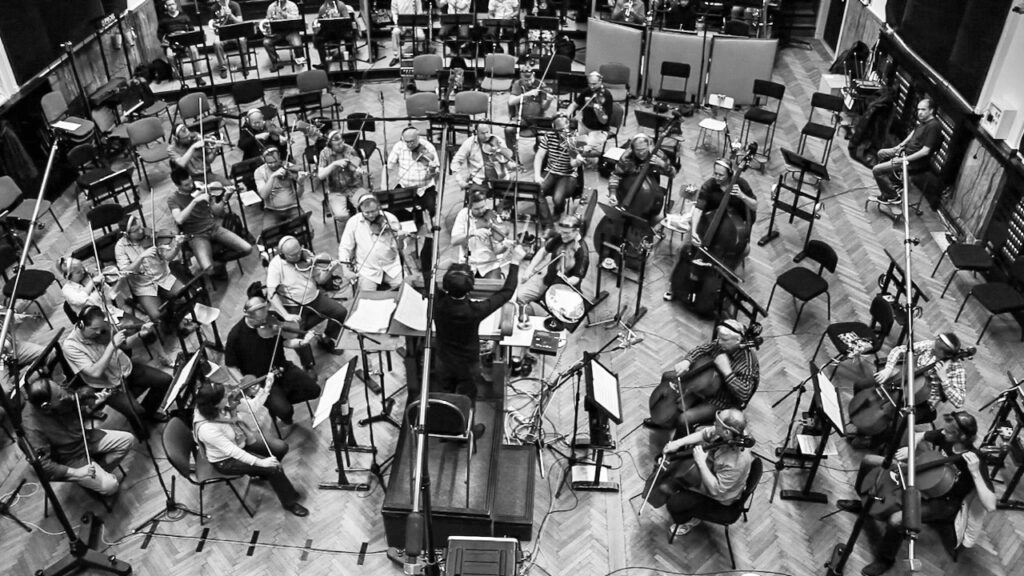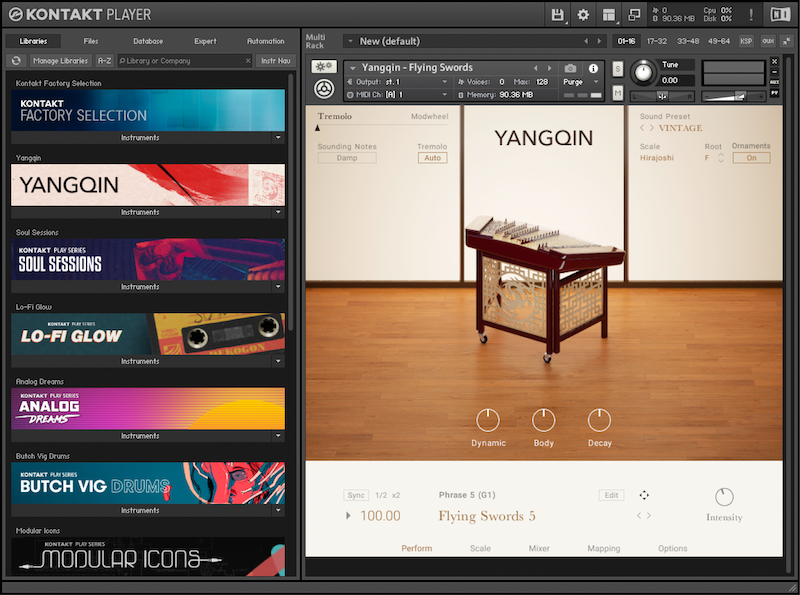Table of Contents
Pursuing a career in film music requires careful consideration. Being freelance alone is tricky, the chances of making a living in music are few, and the opportunities to do so as a film, TV, or game composer are even fewer. In this article, we will take a look at Mark Slater’s career path, examine some of the essential skills, and consider some of the challenges of this career path and future threats to the industry.
Mark Slater: An Unexpected Career
Mark Slater began delving into music technology and composition for film and television in the early 1990s. Prior to this he had never given it much thought and had sensibly uput aside thoughts of music becoming his primary means of living. Access to computers and music technology was rare and all his experience was in the realm of acoustic performance and classical music – a journey that spanned fifteen years and involved immersing himself in disciplines such as cello, piano, and singing at the prestigious Christ Church Cathedral, Oxford.
Embarking on a career journey within the highly competitive realm of film music, Slater’s seemingly quick success was, in truth, the culmination of 16 arduous years meticulously spent honing his skills and amassing an arsenal of high-quality equipment. In this time, he undertook the demanding challenge of earning a Master’s degree in composition for film and television, demonstrating unwavering patience, formidable determination and relentless diligence. Slater’s tenacity eventually rewarded him with his long-awaited break – the once distant dream of recording at the globally-renowned Abbey Road Studios became a significant reality. This pivotal moment not only marked the firm establishment of his aspiring professional career but also signified the fruitful end of his difficult yet rewarding journey from mere aspiration to tangible reality.
Charting Your Path: Steps to Become a Film Composer
Building a career in film music isn’t just about composing the perfect score. It’s about navigating a path that intertwines artistry with industry and creativity with commercial viability. Mark Slater’s journey is illustrative of this complex process.
Beyond having a knack for music or a degree in composition, the success of a film composer hinges on several key elements. First and foremost, aspiring film composers must develop an intimate understanding of different film genres, directing styles, and storytelling techniques. This deep knowledge is a prerequisite to creating a musical score that can effectively support the emotional narrative of a film.

Slater often shares how he would spend countless hours watching movies of different genres, paying close attention to their soundtracks and analyzing how they tied in with the overall narrative. He believes that a good understanding of diverse film styles and storytelling methods directly translates into nuanced and effective scoring.
Embracing the Future: The Role of Technology in Modern Film Composition
In the budding years of Slater’s journey within the film music industry, he witnessed drastic technological evolutions. Beginning with the shift from analogue multitrack digital tapes to contemporary hard disk recordings, a palpable change was already rippling through the sphere of music composition. Gradually, once indispensable hardware synthesizers found their functionality usurped by samplers and eventually, virtual instruments streamed directly from hard disk drives.

Akin to a sweeping wave revolutionizing the industry’s landscape came the emergence of home computers and Digital Audio Workstations (DAWs). Software platforms such as Logic Pro and Ableton Live began to permeate the composer’s toolkit, sparking an impactful transformation within the realm of film music. This high tide of technology inaugurated a new era, where music composition was no longer confined to physical instruments or recording studios. With a few simple clicks, composers could now construct musical landscapes, manipulate notes and sounds, and mix tracks to near perfection, all within the virtual realm.
In this modern era, Digital Audio Workstations (DAWs) have evolved to become crucial resources for film composers. Parallelly, the advent of notation software like Sibelius and Dorico has eased the task of generating professionally rendered music for recording sessions. Yet, the endeavor of composing music still remains a labor-intensive and strenuous process.
As we cast our gaze into the landscape of the future, it is anticipated that Artificial Intelligence (AI) will progressively carve out a more prominent role within music production. This transformation entails AI not merely crafting preliminary melodies or harmonizing tones, but also the meticulous generation of highly realistic instrumental ensemble mock-ups, attainable with a mere touch of a button.
For those who aspire to score films, this evolving landscape clearly implies an imminent challenge. The demand for their expertise and skills may dwindle, as film directors – with little to no training in music – might find themselves adequately equipped to underscore their own projects.
Educational Preparations: The Must-Have Degrees for Aspiring Film Composers
At present, the cornerstone of any budding film composer’s skill set is a comprehensive understanding of music theory, harmony, and counterpoint — all crucial elements that breathe life into the mysteries of different film genres. Equally essential are the technical skills in mixing, producing, and mastering, not to mention the age-old art forms of music notation, conducting, and playing musical instruments.
Academic establishments, notably colleges and universities, offer a myriad of courses geared towards film music. These educational opportunities are the foundations upon which one can amass rudimentary experience and knowledge in this specific field. Furthermore, affiliations with these institutions often facilitate budding composers’ first stints at scoring for films, often orchestrated in collaboration with film students. This networking within the academic environment can also pave the way towards internships with eminent studios and professional composers – a step that could significantly propel one towards a promising career in film music.
Ultimately, aspiring composers need to cultivate an ability to produce music from their personal systems that not only boasts a professional sound but also captures the essence of contemporary film music trends. In raw terms, they need to transcend mediocrity. The field is intensely competitive, with scant opportunities available; only those with an unyielding determination and an extraordinary talent stand a chance to emerge victorious.
Challenges Faced and Triumphs Celebrated: Mark Slater’s Career Highlights
When the chronicles of Mark Slater’s career are read, it’s easy to be seduced by his many accolades and contributions to the film music industry, but the road to success, as Mark would often intimate to those fortunate enough to share his company, was far from smooth. The ebbs and flows of his journey are replete with challenges and victories, each serving as vital stepping stones that shaped him into the creative powerhouse he is today.
In his early years, Mark battled against the dual foes of inexperience and obscurity. How to stand out in a sea filled with talent and ambition was the question that kept him up at night. His resilience bore fruit when he received his first breakthrough in the form of an animated feature film, Flatland. The exacting process of music composition, done within the confines of a shoestring budget and constricting timelines, was a baptism of fire. Yet, it was this very adversity that helped him hone his creative resilience and learn to thrive in high-pressure environments.
Embarking on increasingly illustrious ventures, film composer Mark Slater experienced a proportional surge in pressure. Undeniably, one of the pivotal responsibilities in any project is to effectively translate the director’s ambitious concept into a suitable and stylistically aligned musical score. The challenge broadened with every project, compelling Slater to determine the ideal soundtrack style and theme. A notable triumph of his was his contribution to the scientific documentary 400 Years of the Telescope.
While his score for this film was celebrated within its intended audience, it faced scrutiny among segments of the mainstream film production sphere. Nevertheless, this professional endeavor catapulted Slater into a realm that was both thrilling and demanding, as he began to collaborate with filmmakers from the realm of immersive and giant screen cinema. This venture into magnificent film production atmospheres provided him an opportunity to nurture and affirm his distinctive artistic identity.
Triumph did not only come in the form of successful projects. Often, it was the failed ventures, the missed opportunities that imbued Mark with lessons invaluable. The greatest triumph, after all, is the growth of a craftsman, isn’t it?
“You need to make peace with the fact that you’re going to create something that some people will passionately dislike. Embrace it, learn from it, and let it propel you forward into becoming a better composer,” Mark once said, in his characteristically introspective manner.
The Unseen Maestro: Impact of Film Composers on Cinematic Experience
Renowned film composers like John Williams, James Horner, and Jerry Goldsmith, to mention but a few, have irrefutably crafted our collective consciousness through their evocative melodies and resonant film scores. While there’s no denying their intense dedication to their craft, one cannot overlook the element of chance—the fortuitous combination of being in the perfect place at the most opportune moment—that propelled them to the pinnacle of their profession.
Even though the odds for work in the industry are slim, Mark Slater continuously imparts hope to his students at Andvision International Music School in Tokyo, emphasizing the importance of relentless hard work and the necessity of networking within the profession. He underscores the value of considering alternate roles within the industry. Being a composer, he remarks, is one of many potential paths in film music. The industry also relies heavily on the skills of audio engineers, music preparation services, orchestrators, and instrumentalists.



Pingback: Seduction by Light - Philips Aurea Campaign - Mark Slater